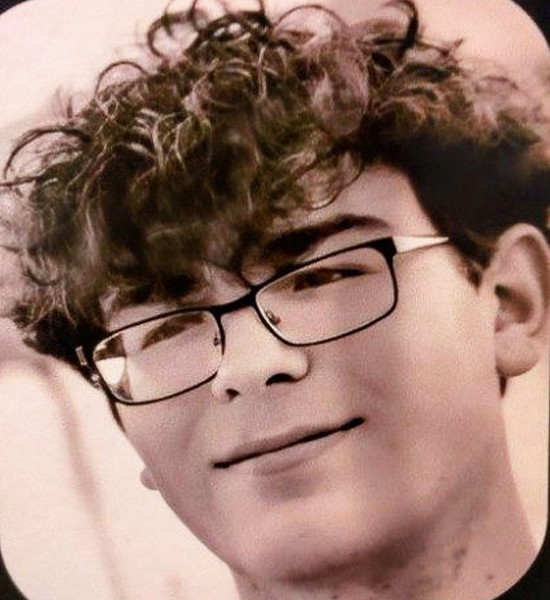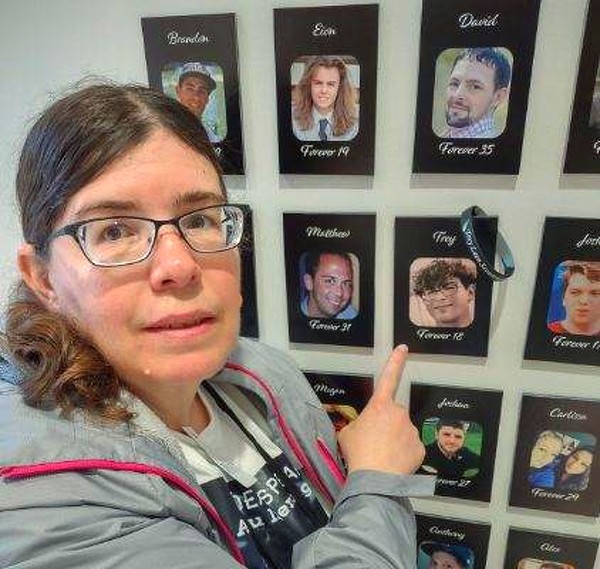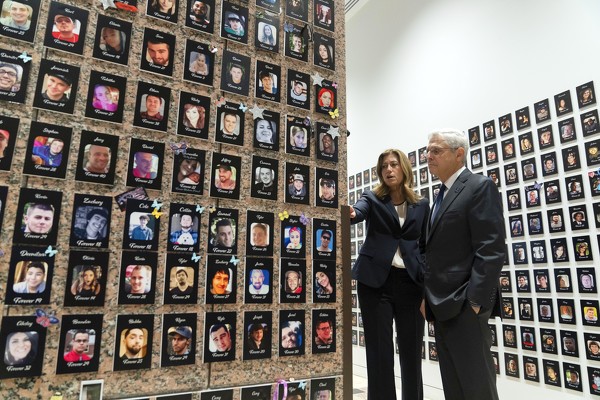
Trey Scouten, Celina, died from fentanyl poisoning in 2022.
CELINA - Becky Smith of Celina recently flew to Washington D.C. where she joined throngs of activists in a march to the White House, demanding the federal government take decisive action to halt the deadly fentanyl epidemic.
Smith was driven to participate in the third annual Lost Voices of Fentanyl Rally: The Dead Speak rally on Sept. 23 out of a desire to advocate for change and represent her son, Trey Scouten, a talented dancer, church volunteer and animal lover who died just over a year ago from fentanyl poisoning.
She was accompanied by her sister, Britney Calvelage, and niece Maya Calvelage, both of Delphos, and friend Julia Battle of Atlanta, Georgia. Attendees gathered before the Washington Monument in the National Mall to commemorate victims, share their stories and hear from a slate of speakers before making their way to the White House.
"We flew to D.C. to be Trey's voice," Smith said. "I was able to meet other mothers and fathers who have lost their children to fentanyl. It's … a group you don't want to be a part of but don't get the option to opt out of it."
The pain of losing one of her two sons to the synthetic opioid is still fresh but Smith was able to come away from the rally with a measure of comfort.
"It was a very healing event for me because it was the first time that I felt not alone, that I felt that I was doing something for my son," she revealed. "Through this whole thing I have felt very alone, very isolated. Why my child? Why my child?"
Smith said she also lost a niece to fentanyl poisoning, Kylie Smith of Lima, two years ago. Their pictures were among more than 5,000 featured on a seemingly never-ending series of banners erected at the National Mall, according to Smith.

Becky Smith, Celina, locates the memorial to her son, Trey Scouten, at the U.S. Drug Enforcement Administration in Washington D.C. in September 2023. Trey died from fentanyl poisoning in 2022.
Seeing all the faces, many of them of children, was absolutely devastating, Smith said. Young people, she pointed out, often reach for what they believe are prescription medications to study or at a party. Some fentanyl pills are even candy-colored.
"Every 11 minutes we are losing someone to fentanyl," Smith said. "Trey's story is not unique. These are not drug addicts. These are not criminals. These are kids who are trying to stay awake to take a test, and they're taking what they think is an 'Addy' or an Adderall and they go to sleep and they never wake up and the parents find them in their beds the next morning. They go to a party and think they're taking a Percocet and it's fentanyl. It's story after story after story."
Considered exponentially more addictive than heroin, fentanyl is now the leading cause of death for Americans ages 18 to 49. A tiny amount, 2 milligrams, ingested into the body can be fatal.
It costs less than a penny to buy the chemicals needed to make a lethal dose of fentanyl, making its potential availability virtually limitless.
The drug is frequently mixed into the supplies of other drugs or pressed into counterfeit prescription pills, like oxycodone. Some people never know they are taking it.
More than 100,000 deaths a year have been linked to drug overdoses since 2020 in the U.S., about two-thirds of those are related to fentanyl. The death toll is more than 10 times as many drug deaths as in 1988, at the height of the crack epidemic.

Photographs of people who had died from drugs are on display during the Second Annual Family Summit on Fentanyl at DEA Headquarters in Washington, Tuesday, Sept. 26, 2023. (AP Photo/Jose Luis Magana)
Smith described Trey as a deeply loving person who always put God and others ahead of himself. He began formal dance training at 8 and began competing in his teens. Also, Trey adored taking care of four cats and a dog, went on mission trips with his church and was avidly interested in cars, she noted.
Like a lot of curious kids, Trey as a teenager dabbled in marijuana but was terrified of hard drugs, Smith said.
On Sept. 20, 2022, in the midst of his second full week of a new job, Trey came home from a 12-hour shift and told his mother he loved her for the last time. Later in the afternoon, he went to visit a friend in Fort Jennings. Between 5:30 p.m. to 5:45 p.m., Rey ingested nearly five times the lethal dose of fentanyl and died, Smith said.
His official cause of death was fentanyl toxicity, Smith said, adding no other drugs, either over-the-counter or illicit, or alcohol were found to be in her son's system.
Smith believes Trey may have taken something - perhaps thinking it was an Adderall or a pain medication - which ended up being pure fentanyl. The family may never know for sure how he came into contact with the drug, he said.
"You never move on. There is no normal, there just isn't," Smith replied when asked how she's coping with the passing of Trey.
She did, though, come across other people also grieving the loss of loved ones from fentanyl. Lost Voices of Fentanyl is a non-profit organization comprised of bereaved families devoted to education, public awareness and the prevention of illicit fentanyl poisonings, Smith said.
Some of the group's political aims were expressed at the rally in Washington D.C., chief among them the securing of the U.S-Mexico- border, according to Smith.
"Right now the drug is coming from China into Mexico and our borders are wide open for it to cross over … in the United States," Smith said. "There is nothing stopping it. We can no longer out-arrest this epidemic."
Members would also like to see fentanyl bumped up to a Schedule 1 substance classification, Smith said. Bob Latta, R-Bowling Green, who represents Mercer County and other areas of the state, is a cosponsor of the HALT Fentanyl Act. The legislation, according to sponsor Congressman Morgan Griffith, would strengthen law enforcement's ability to prosecute fentanyl traffickers.
"It's almost like a Band-Aid fix, but it would at least give us some teeth," Smith said.
Asked if she feels the members' concerns are being taken seriously by government officials and lawmakers, Smith said, "I think our voices are being heard, I just wish more could be done, but I know things are going to progress slow."

Attorney General Merrick Garland accompanied by U.S. Drug Enforcement Administration Administrator Anne Milgram, looks at photographs of people who had died from drugs during the Second Annual Family Summit on Fentanyl at DEA Headquarters in Washington, Tuesday, Sept. 26, 2023. (AP Photo/Jose Luis Magana)
Last Tuesday, at the Second Annual Family Summit on Fentanyl at the headquarters of the U.S. Drug Enforcement Administration in Washington D.C., Attorney General Merrick Garland said that the Justice Department is sending out some $345 million in federal funding over the next year, including money to support mentoring for at-risk young people and increase access to the overdose-reversal drug naloxone.
"We know that fentanyl is a nearly invisible poison, and that many people who take fentanyl have no idea they are taking it," Garland said. "We know that no one - no one person, and no one family - can defeat this epidemic alone. We need each other."
Smith said her nascent advocacy may take on other forms in the future. Right now, she said the experience of losing a child is too raw for her to go into local schools to talk about the dangers of fentanyl but acknowledged that may change one day.
"We definitely need more education," Smith said, urging parents to talk about fentanyl to their kids. "We need our children to know that one pill can kill. Just trying it one time can kill them. Seven out of 10 illicit pills now contain fentanyl."
- The Associated Press contributed to this story.
